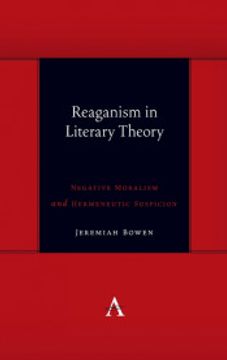Reseña del libro "Reaganism in Literary Theory (en Inglés)"
Reaganism is a discourse of devotion and disqualification, combining a neoliberal negative theology of the market with a neoconservative demonization of opponents. By representing the market as a... Leer másReaganism is a discourse of devotion and disqualification, combining a neoliberal negative theology of the market with a neoconservative demonization of opponents. By representing the market as a moralistic standard of perfection, a representation of goodness and freedom, Reagan's personality cult organizes a social fantasy that shelters from inquiry the aggressivity of the market as a war of all against all. In literary theory and criticism, a homologous valuative system centered itself on the canon, which covers for exclusionary social systems by representing them as devoted agents of culture, defined as the Arnoldian study of perfection. Paul de Man argued for the displacement of this positive moralism, critiquing its referential structure for its failure to account for the arbitrariness of signification. But de Man's proposals ultimately replace the system of culture and canon with a negative moralism, centered on literariness defined as a negative referent, a representation of the impossibility of desire to achieve its aims.De Man's premises have been perpetuated in subsequent theory by persistent misrecognitions of dialectic as suspicious hermeneutics, of materialism as reference to materiality, and of demands for democratic equity as identity politics. The book traces this motivated reasoning through misreadings of Eve Sedgwick's critique of conspiracy theory and Edward Said's "secular criticism," we are led back to the unexamined premises of Paul de Man's negative moralism and the opportunistic competition of academic careerism. Stephen Best and Sharon Marcus cite Sedgwick to propose "surface reading" as an alternative or supplement to the hermeneutics of suspicion. But in failing to acknowledge that Ricoeur's definition of a method common to Marx, Nietzsche, and Freud in terms of suspicion is a form of "defining the opposition," which constructs the other as a negative image of the self. Their theoretical blind spots are thus linked to political or historical blind spots, and their willingness to accept bad faith objectifications of opponents is linked to the interpretive structure of privilege, in which narcissism organizes and sanctions aggressivity.Like Sedgwick, Edward Said interrogates the homologies among interpretive, political, and historical patterns of behaviour, discerning the implication of literary studies in the rise of Reaganism. His secular criticism proposes an alternative to Reagan's devotion to markets as well as the humanities' devotion to canon, but it is attacked by J. Hillis Miller and Stanley Fish as a form of referential moralism. This line of attack is predicated on de Man's arguments for the impossibility of reference, read as an alibi for competition and opportunism. A new explanation for the connections between de Man's literary theory and his opportunist collaboration with Belgium's Nazi occupiers is suggested by his use of arbitrary signification to obviate solidarity and cooperation in many forms--whether it be truth as intersubjective verifiability, justice as coincidence of interests, or aesthetic harmony as the compatibility of diverse preferences. His arguments to replace logic with aesthetics as the primary criterion of judgment are homologous with the replacement of the rule of law with personal rule, an unprincipled opportunism demonstrated by both supremacist politics and market competition.

